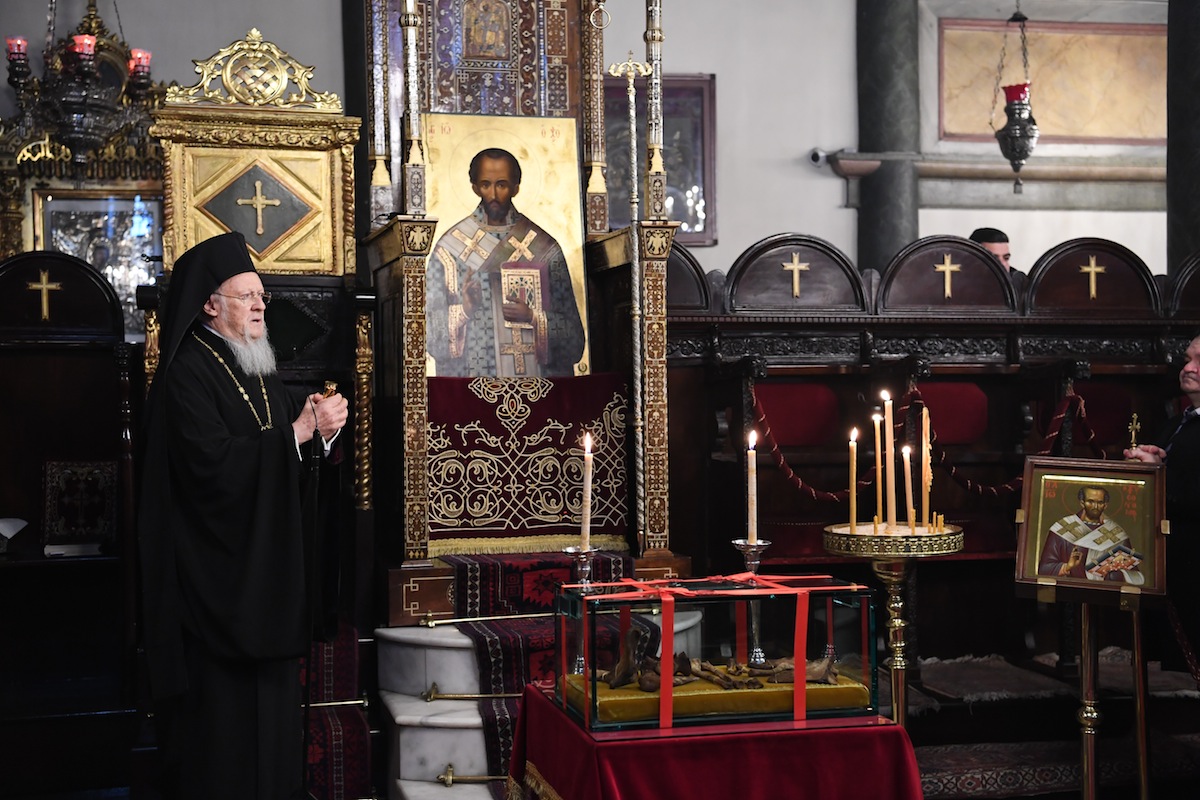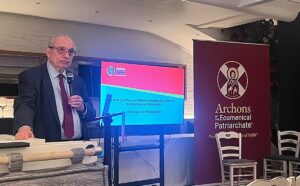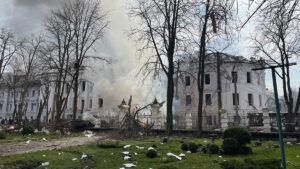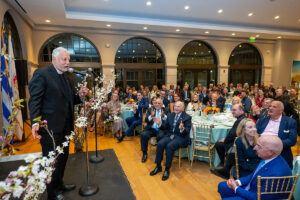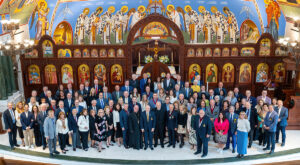Addressing pilgrims from Greece and Cyprus shortly after today’s Divine Liturgy at the Phanar, His All-Holiness spoke on the occasion of today’s 70th anniversary of the enthronement of Athenagoras as Ecumenical Patriarch, about the work and the multi-dimensional ministry of the Mother Church.
The timeless ministry of the Mother Church of Constantinople was discussed by the Ecumenical Patriarch Bartholomew, who celebrated the Divine Liturgy today, Sunday, January 27, at the Phanar, in memory of St. John Chrysostom, one of the three holy hierarchs and ecumenical teachers of the Church, whose holy relics can be found in the most venerable Patriarchal Church.
In accord with tradition, the Ecumenical Patriarch celebrated from the parathronion, while the holy icon of St. John Chrysostom was placed on the Patriarchal throne. The Metropolitans Chrystomos of Myra; Stefanos of Kallioupolis and Madytos; Athenagoras of Kydonia; Maximos of Ioannina; Elias the Bishop of Tartu; Kyrillos of Abydos; official Archons, faithful from the city and a crowd of pilgrims from abroad were present.
In his address, the Ecumenical Patriarch referred to the personality and invaluable spiritual work of his predecessor, St. John Chrysostom, who was driven into exile, where he breathed his last breath, because he did not hesitate to criticize the illicit deeds and activities of the secular power of his time. “Many politicians and in non-democratic countries do not like and do not accept criticism. And when a spiritual leader, like the Holy St. John Chrysostom, dares to criticize the misuse of power on the part of the political leadership, he is imprisoned or exiled; he disappears. Thus St. John Chrysostom, the great Archbishop of Constantinople and ecumenical teacher, died in Armenia, in the Commana.”
He then referred to today’s 70th anniversary of the enthronement of the eminent Ecumenical Patriarch Athenagoras, who began his Patriarchate in auspicious conditions, but after only a few years, both the Patriarchate and its immediate flock were confronted with difficult situations, such as, among others, the events of September 1955, “the pogrom that destroyed what was Christian,” and the later closure of the Theological School of Halki and the contraction of the Greek population of Turkey.
The Ecumenical Patriarchate, the ruling and afflicted Church, endured. And it remains here firmly and heartily welcomes you, venerating her saints and strengthened by her saints, still enlightening Asia Minor, not just in the seven Churches of the Apocalypse, but also in many other respected holy sites of our faith, in Cappadocia, and in Pontus, Pergamon, Ephesus, and so on. We promote dialogue with the other Churches, as was the vision of Patriarch Athenagoras. Our Patriarchate revitalized the Autonomous Church of Estonia and gave autocephaly to the Church of Ukraine. The Church of Constantinople always meets the demands of the times, has a vision for the future, and, as far as it is concerned, fulfills in its entirety the Ecumenical aspect of its mission. And, as the Alexandrian poet would have said, never from the right did I deviate.”
Ecumenical Patriarch Bartholomew welcomed groups of pilgrims from Ioannina and Lamia as well as Thessaloniki, and in particular from the Seraph Parish of Sarov, and the Holy Metropolis of Neapolis and Stavropoleos.
“The Metropolitan of Neapolis, very mercifully, created this the parish for our Slavonic-speaking brothers who had been repatriated to Greece after the collapse of the Soviet Union. He did not let them suffer, but created this parish where the divine services are performed according to their customs, their traditions, and their language, and they follow the Julian calendar, proving once again that the thirteen days separating the Julian from the Gregorian calendar is not a matter of faith, as is claimed by the schismatic Old Calendarists in Greece and elsewhere. And in the last few years they have found ecumenism to strengthen their positions, but are cut off from the canonical Church. They think that in those thirteen days, and in harsh words against the canonical Church and its officers, they will find salvation. And they are misguided.”
He then welcomed a large group of pilgrims from the Holy Metropolis of Constantinople and Famagusta of the Church of Cyprus, honoring the their Priest, Metropolitan Vassilios, and especially the respect that he gives to the Ecumenical Patriarchate. Special mention was made of Chrysostomos, Archbishop of Cyprus, who a few days ago, in a statement, said that the Church of Cyprus is always committed to the Church of Constantinople, calling it the “Mother Church.”
“His Beatitude wanted to show his feelings of his Church toward this holy center of Orthodoxy, and we also thank him for his attitude toward the preparation and the conduct of the Holy and Great Synod of the Orthodox Church. I always call His Beatitude of Cyprus a giver, because he stands on his word, because he has courage, as we say, he has boldness. He says what he believes. And we are grateful to him, and we are proud of him, and we pray for his health, which has been poor lately. We hope that with the grace of St. John Chrysostom, whose name he bears in veneration, will soon be fully recovered and with continue for his ordained ministry and mission for many years.”
